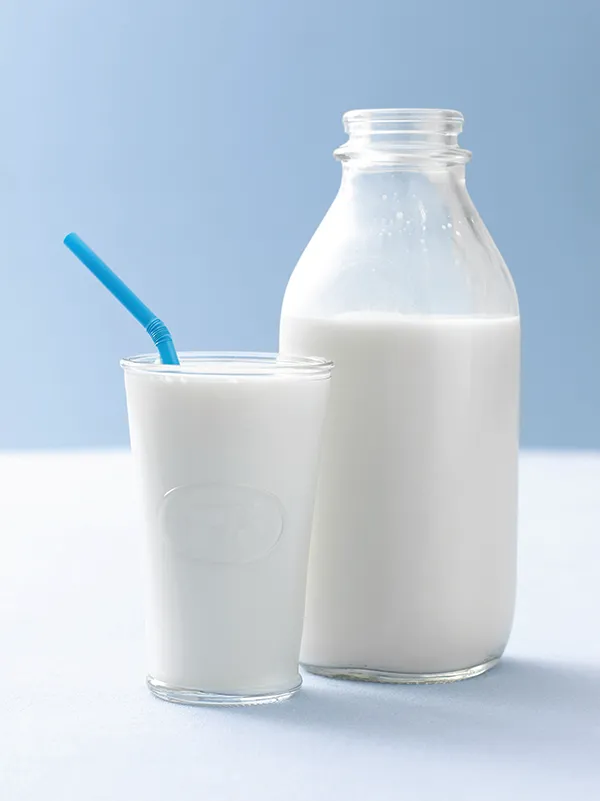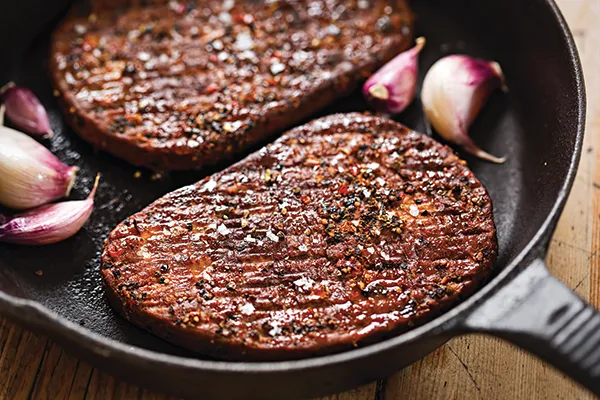Algae

Seaweed grows quickly and is a core part of Japanese diets. As it can be grown at sea, it would solve the issue of dwindling land for crops. There are thousands of varieties that could be farmed and eaten.
Wheat gluten

Also known as wheat-meat, seitan or mock duck, wheat gluten is made from the ‘glue’ of wheat. As well as having a higher protein content than more well-known meat substitutes such as tofu, its chewy consistency also gives it a meaty texture. It’s thought to have been first produced by Buddhist monks who adhere to strict vegetarian diets, and it’s particularly popular in Asian cuisine. Although wheat gluten tastes bland on its own, it’s good at absorbing flavours.
Artificial meat

Back in 2013, the world watched as food critics tucked into the first ever lab-grown burger. The small pink patty, prised out of a petri dish and fried in front of the media, was proof that it was possible to grow safe and edible meat without slaughtering a single animal. There was just one problem: the patty had taken two years and over $300,000 (£231,000) to produce. Fast forward a few years and costs have plummeted. One company who makes artificial meat – Memphis Meats – says it costs $2,400 to produce, due to the pricey medium needed to culture cells. But the company aims to reduce that cost to under $5. The key is scaling up the technology to the level of an industrial food process. Polls suggest there’s a willingness to give this modern meat a go. A survey by The Guardian found that
68 per cent of people wanted to try cultured meat. But whether people reach for
cultured burgers at the supermarket is a different matter entirely.
Synthetic milk

Perfect Day is one of the companies developing cow-free milk. Milk-producing genes are inserted into yeast, which are then bred to produce milk proteins. The company, based in Cork, has raised €20.9m to get its milk to market.
Fungi

No, not mushrooms – mycoprotein. You’ll probably recognise the brand Quorn, named after a Leicestershire village. Quorn is made by growing the filamentous fungus (mould) Fusarium venenatum in fermentation tanks. The mycoprotein used to be marketed as ‘mushroom protein’ until manufacturers were told to stop by the Advertising Standards Agency. It’s now described as a “member of the fungi family”. Earlier this year, a report claimed Quorn worldwide sales increased by 16 per cent last year (and 25 per cent in the US) and is set to become a billion-dollar business in the future.
Could veganism save the planet?
According to figures from the Consultative Group on International Agricultural Research one-third of our greenhouse gas emissions come from agriculture. But that’s just one factor. Our food system is also the leading cause of deforestation, land use change and biodiversity loss in the world. Then there’s overfishing, pollution, groundwater depletion, excessive fertiliser use and pesticides to contend with as well. So what can be done?
A paper published in 2016 in Proceedings Of The National Academy Of Sciences concluded that a mass switch to vegetarianism would bring down food-related greenhouse gas emissions by a whopping 63 per cent. Even just sticking to global health guidelines regarding meat consumption would be enough to reduce emissions by 29 per cent.
Going vegan, however, seems to have the edge in the planet-saving stakes. Many of the issues that arise from farming livestock for meat – methane emissions from animal digestion, pollution from farms, energy-intensive feeds – also apply to the dairy and egg industries. If widespread veganism was adopted, that 63 per cent reduction in emissions shoots up to 70 per cent.
Despite this, it’s thought only 2 per cent of the UK population is vegetarian, and less than 1 per cent is vegan. But maybe cutting out animal products isn’t necessarily the way to go.
Some research has suggested that at least some degree of carnivory could be beneficial. A recent analysis of 10 diets, each with a different ratio of meat and animal products, saw veganism relegated to fifth place when it came to maximising sustainable land use, below different degrees of vegetarianism and omnivory.
Read more 2019 science breakthroughs:
Relatively simple changes can make a difference, but when considering the scale of our food system’s impact on the planet, something bigger might be necessary. Industrial agriculture has been our go-to system for decades, but the overuse of chemical pesticides and fertilisers is resulting in degraded ecosystems that are not sustainable.
A solution could be agroecology, a fancy term for restoring biodiversity and ecosystem functions in order to ensure productivity. These principles are already being put into action. As it stands, rice accounts for up to a third of our annual water use, but a low-water agroecological method known as System of Rice Intensification (SRI) is increasingly being used to produce rice yields up to 50 per cent larger. Water is only applied to the rice when needed, compost is used instead of chemical fertilisers and farmers weed by hand instead of using herbicides. Using this method, Sumant Kumar, a farmer from the Indian state of Tamil Nadu, has smashed the previous annual rice-growing record by an astonishing three tonnes.
A truly environmentally friendly diet relies on major systemic changes, but individual diets also need to change. The variety of data on offer can give the impression of flip-flopping within the scientific community, but it’s more indicative of the sheer complexity of the subject – not to mention the competing interests of stakeholders in the food industry.

Follow Science Focus onTwitter,Facebook, Instagramand Flipboard